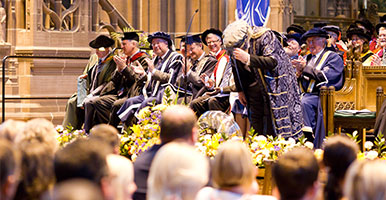Professor Sir Howard Newby CBE
Presented by Professor Phil Redmond
Knowledge exchange is a key feature of any university. It is fundamental to the mission of a university to act as a catalyst to help benefit communities, both economically and socially, and enhance the reputation of the city in which it is based.
In his role as Vice-Chancellor of the University of Liverpool, a position he held for over six years, Professor Sir Howard Newby, helped to enhance this link between academia, industry and the community through many initiatives – working in partnership with LJMU to establish such groundbreaking developments such as Liverpool’s knowledge quarter and the city’s first science park.
Passionate about the internationalisation of the university curriculum, Howard has established outstanding opportunities for home students at the University of Liverpool to benefit from opportunities to study at their partner university in China, at the same time as enhancing the University of Liverpool’s reputation for world leading research and becoming the largest provider of online postgraduate degrees in Europe.
Howard is an adopted son of our city, he grew up in Derbyshire, attended the John Port Grammar School in Etwall, before joining Atlantic College as a scholarship student. He studied Sociology at the University of Essex where he also gained his PhD.
Howard has had a long and distinguished career in the service of higher education. He served as the Chief Executive of the Higher Education Funding Council for England, President of the British Association for the Advancement of Science, Chair and Chief Executive of the Economic and Social Research Council and President of Universities UK, which acts as the representative body for the university sector in this country.
He has not only been the voice and influence for higher education at national level, dealing with successive governments and their ambitions for the university sector, he has been successful at the day job as well, serving as Vice-Chancellor of three large universities, in Bristol, in Southampton and finally in Liverpool.
In all of these roles he has demonstrated an extraordinary ability to lead, inspire and communicate with a range of agencies and individuals and for which he was first recognised with a CBE for services to social science and then a knighthood in 2000 for services to higher education.
Howard has also maintained his own passion for education and for his subject, publishing a range of books and articles on social change in rural England and possessing the distinction of having professorial appointments in institutions both at home and at the University of Wisconsin-Madison in the United States. He has received honorary degrees from ten British universities.
Although he is officially retired, Howard continues to maintain a level of enthusiasm and commitment to the city of Liverpool as a member of, the Liverpool Mayoral Development Corporation Board and he chairs the Daresbury Enterprise Zone Board. Recognising his lifelong interest in railway history, he also chaired the Board of the National Railway Museum for seven years and he is also a deputy Lieutenant, supporting the Lord Lieutenant as the Queen’s representative on Merseyside, a role which he, with wonderful support from his wife, Lady Sheila, is able to enjoy as a resident of this great city.
Higher education makes a fundamentally important difference: to individuals, through improved life chances and opportunities; to the economy, through innovation and skills; and to society, increasing our knowledge, through research discoveries and increasing social mobility and cohesion. And it is through inspirational leaders such as Professor Sir Howard Newby that this is achieved.
Thus, it is with great pleasure that I present Professor Sir Howard Newby, this most distinguished adopted son of our city, for admission to our highest honour, as an Honorary Fellow of Liverpool John Moores University.



